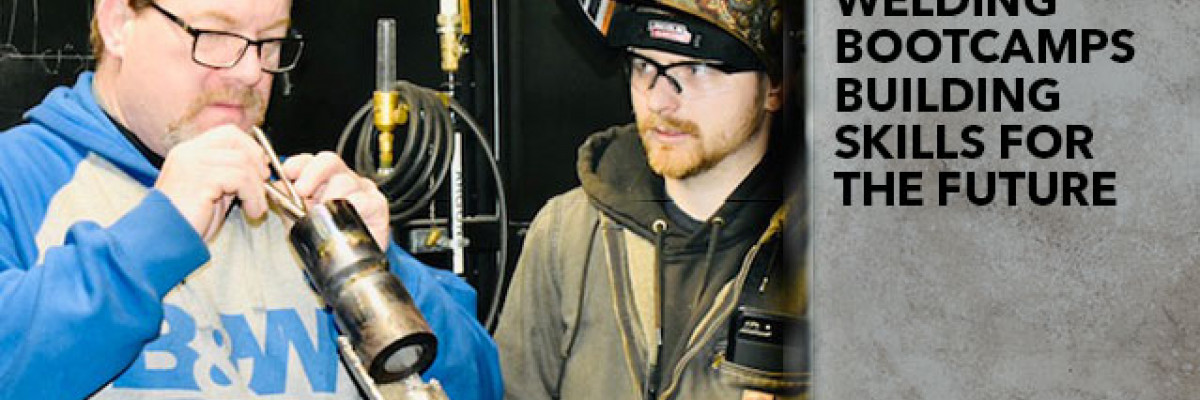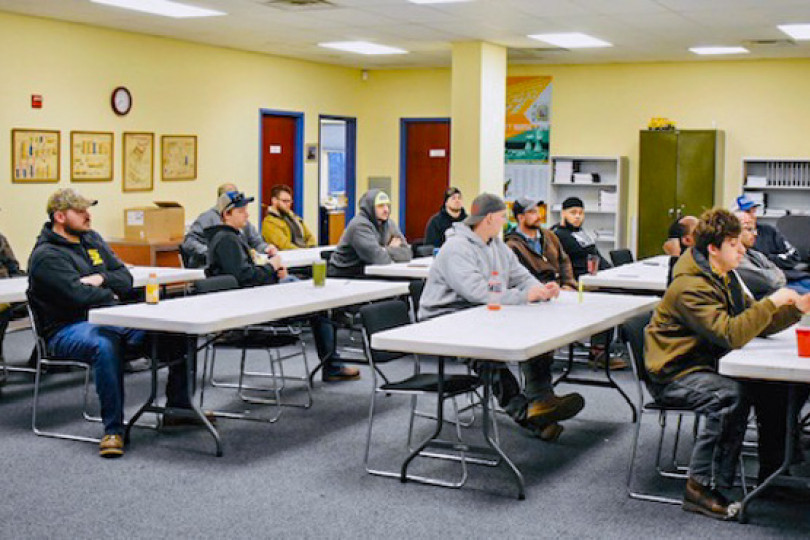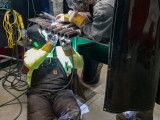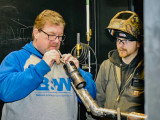Training benefits recruits, apprentices and journeymen
CONSTRUCTION SERVICES OPERATIONS, along with the National Transient Division and the Boilermaker National Apprenticeship Program launched Welding Boot Camp — a detailed, structured training program to teach welding to recruits, apprentices and journeymen. Since the initial boot camp in July of 2018, over a dozen local lodges have hosted the program throughout the United States. It’s new, and it’s promising — with an 88 percent pass rate on testing for welding certifications given at the end of each program.
Jeff Hughes, CSO’s Director of Training Services, created the new training program as a way for the union to produce additional well-trained workers for field construction.
“If we’ve got the skilled manpower, we’ll get the work,” he says. “If we can generate more welders, then when other crafts are short, we can man their work.”
The boot camp is also a recruiting and retention tool. When a person applies to become an apprentice, the applicant is slotted into one of four groups: group four – no experience; group three – went to school for welding; group two – passed a structural welding test with a contractor; and group one – passed a tube test.
According to Director of National Recruitment Services Tim Simmons, most applicants fall into groups three and four — but local lodges prefer to indenture apprentices from groups one and two. In addition, Hughes says that occasionally an applicant lands in group one or two but there’s no room in the local to indenture them at the time of application.
“Sometimes you have a good candidate and can’t fit them into a local’s apprenticeship program. Boot camp is an effort to keep promising talent,” Hughes says. “There are also intermediate welders who are current members but need to be groomed for productivity on the job site.”
That’s where the boot camp comes in.
The program is set up like a job site. Students in small class sizes work 10 hours a day, six days a week training. They continuously progress over three weeks, learning test-ready techniques in SMAW and FCAW. If they qualify during boot camp, they’ll work through another three weeks of tube training, both individual and buddy. The majority of participants travel from out of town, so they’re housed in a hotel with a roommate. They receive $25 a day for food. BNAP and area apprenticeship programs split the cost for the boot camps.
At the end of boot camp, contractors test the students.
“We put them through the basic conditions they’d experience on the road,” Hughes says.
The boot camp also gives apprentices an avenue to get through the four-year apprenticeship program in a shorter amount of time “because they gain the skillset to work more hours,” Hughes says.
Jim Chew, BM-ST at Local 28 (Newark, New Jersey), recently held a boot camp at the lodge. Chew said the training was the best thing they’ve done in recent memory. “In this local alone we’ve picked up about 25 certified welders through the boot camp.”
Chew also noted that if attendees make it through the contractor’s testing, they earn Common Arc certification.
“This program is a good way to add more welders to the membership,” he says.
As for the recruits, if they pass testing, Simmons adds them to the Boilermaker Delivery System and puts them to work.
“Welding boot camp gives recruits the opportunity to be evaluated for skill level and enhance their skills to be more employable as a union Boilermaker,” says Simmons, who’s pleased with the program and how it dovetails with his recruiting efforts.
So is Hughes.
“This program is a win for everybody: the apprentice, the local and the union,” Hughes says. “Since Aug. 1, we’ve had over 200-man power requests and we’re short everywhere. Mostly we’re short welders. Welding Boot Camp is one of the tools in the toolbox we’re using to fix that.”
It ‘takes a village’ to run a boot camp
SUCCESSFUL WELDING BOOT camps don’t happen by accident. Many hands and skilled trainers are needed to make sure things run smoothly and effectively. Currently, Hughes relies on three lead instructors: Daniel Brown Local 45 (Richmond, Virginia); Bill Campbell, Local 433 (Tampa, Florida); and Joel Kipfer, Local 26 (Savannah, Georgia).
Tiffany Mellott, BNAP’s office administrator, books the students’ hotel rooms, processes per diem and handles the back-end administration.
Since the boot camp is a new concept, Jay Brophy, MOST mobilization and training rep, promotes the program and scouts Boilermakers who would be a good fit to participate. That’s in addition to his “regular” work load.
“Jay has done a tremendous job in recruiting people for boot camp,” Hughes says. “We work hand-in-hand. He makes phone calls in between Boilermaker Code classes. He’s always active.”









